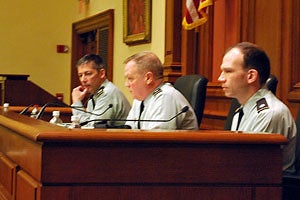A panel of judges of the Army Court of Criminal Appeals came to Harvard Law School February 5th to hear arguments in a drug trafficking case charged under the Uniform Code of Military Justice. The proceedings, held in the Ames Courtroom, offered students a rare chance to observe a military court in action.
“We’re lucky at HLS to have a lot of moot courts held here, but in many ways moots are like seeing the dress rehearsal without ever seeing the play,” said Sarah Miller ’09, co-president of the Harvard National Security and Law Association (NSLA), the student group sponsoring the event. “There’s a real difference, I think, between the way arguments are tested out in moots and the way an argument goes in an actual oral argument, where the stakes are higher and you have the opportunity to see the judges processing the case.”
Both Todd Huntley LL.M. ’09, who is currently serving as a senior Navy JAG officer, and Hagan Scotten ’10, co-chair of the events committee for the NSLA and a military veteran, assisted in bringing the Court to HLS. Scotten served in the Army for nine years and completed three tours of duty in Iraq as a Special Forces officer.
The panel—Brigadier General Clyde J. Tate II (chief judge), Colonel Paul P. Holden, Jr. (senior judge), and Lieutenant Colonel Gregory E. Maggs ’88 (associate judge—see sidebar)—heard arguments in an appeal by a defendant convicted of smuggling 81 kilograms of cocaine into the U.S. from Colombia, where he was assigned to an anti-drug trafficking unit. He was also convicted of transporting $224,000 to pay for the cocaine, and trading and receiving firearms in partial payment for the drugs.
The defense attorneys, Lieutenant Jonathan Potter (photo left) and Lieutenant Colonel Mark Tellitocci, and the government attorneys, Captain Mark Goodson and Major Lisa Gumbs, each had 30 minutes to make their arguments in the complex case.
The defense took issue with the factual support relating to several drug transactions in particular, arguing that the testimony used for conviction was uncorroborated. They argued further that the trial court had incorrectly sentenced the defendant to a mandatory minimum sentence for wrongful use of a firearm.
The prosecution countered that the corroboration issue wasn’t properly before the appellate panel because the defendant hadn’t raised it through a proper objection during the court-martial proceedings. The prosecutors also argued that because the transactions were part of a long-term course of conduct, no additional corroboration was required.
After the argument, the judges and lawyers took questions from students, including several 1Ls participating in Trial Advocacy Workshops.
Established in 1951 as the U.S. Army Boards of Review, the Army Court of Criminal Appeals is currently composed of three judicial panels, each with three or four appellate judges. The Court hears appeals from lower military courts nationwide.
Read more coverage of the hearing in the Harvard Law Record.
